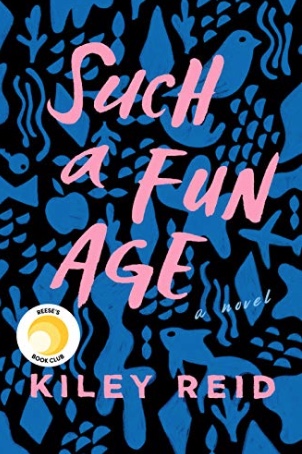
The premise of Such a Fun Age attracted me: it sounded like it had a lot of potential to explore issues around white privilege, misogyny, racism, feminism, black fetishism, peer pressure…you get the idea. I figured it couldn’t do all that without turning into a polemic…surely the story would be lost? Seriously, it is Kiley Reid’s FIRST novel. But thanks to G.P. Putnam’s Sons and NetGalley, I received a copy in exchange for my honest review, so I jumped in.
Here’s the premise: Emira is a young African-American woman who has recently graduated from college and is sort of at loose ends as she prepares to figure out her career path. She is hired as a nanny by Alix Chamberlain, a thirty-something woman who has found a way to make a (good) living from her blog and 21st century online influence peddling, telling other women how to get what they want, just as she has. Alix and her husband have a toddler (trendily named Briar), and late one evening they call Emira and ask her to come get Briar while they deal with a family emergency. Although she is at a party and not dressed for nanny duties, she takes Briar out for some fun time walking the aisles of their local high-end supermarket. The store’s security guard, seeing a young black woman out late with a white child, responds to the concerns of a busybody shopper who essentially accuses Emira of kidnapping Briar. A crowd gathers, a bystander films everything, and Emira is equally furious and humiliated as Alix’s husband rescues her from the situation. Alix (awash in white privilege and guilt) resolves to make things right.
Told from both Alix’s and Emira’s points of view, the story unspools in a smooth way, with humor and well-developed characters exploring several potential sticky topics. I loved some of the descriptive passages, as when Emira comments on Alix’s constantly ignoring Briar: “...Mrs. Chamberlain’s stare went empty and embarrassed as if she’d been caught in the middle of the night, standing in front of the refrigerator, fork in hand and chocolate frosting on her face.” The resolution might be a tiny bit too convenient, and some reviewers have absolutely HATED the characterization, particularly of Emira. I readily admit to being a privileged white person, so my reaction to the racial components is clearly different from that of someone with more experience of interracial situations. I found those reviews fascinating, primarily reminding me how oblivious I have been and remain in this area…but I enjoyed reading it, and I’d love to read a sequel that follows Emira’s path to adulthood. Four stars.
